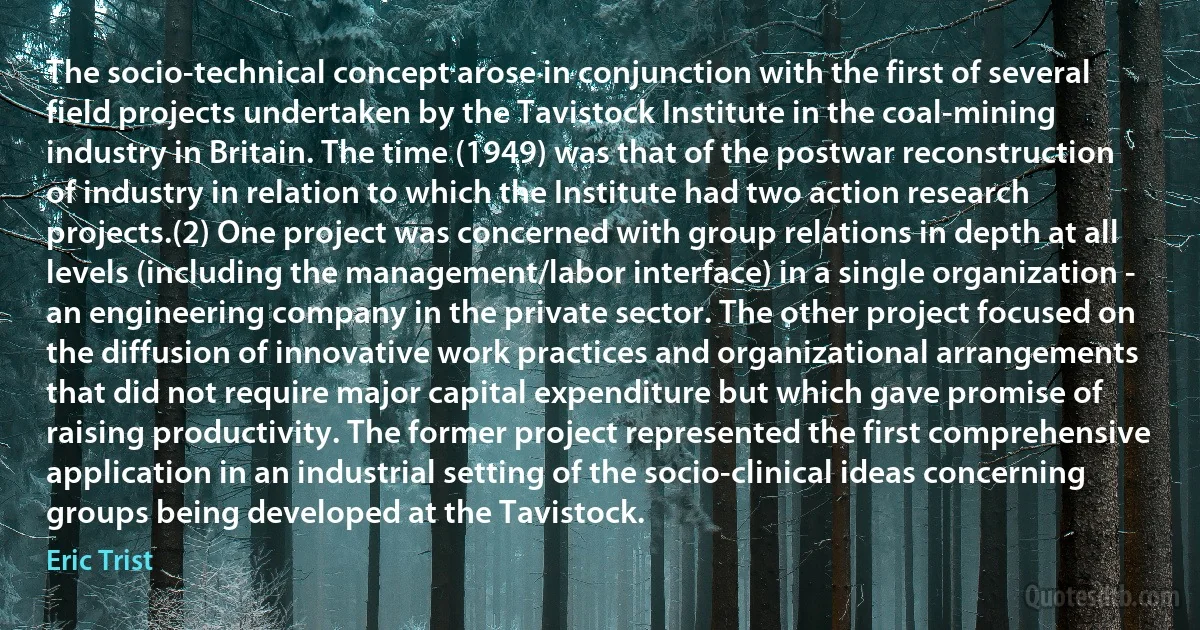
The socio-technical concept arose in conjunction with the first of several field projects undertaken by the Tavistock Institute in the coal-mining industry in Britain. The time (1949) was that of the postwar reconstruction of industry in relation to which the Institute had two action research projects.(2) One project was concerned with group relations in depth at all levels (including the management/labor interface) in a single organization - an engineering company in the private sector. The other project focused on the diffusion of innovative work practices and organizational arrangements that did not require major capital expenditure but which gave promise of raising productivity. The former project represented the first comprehensive application in an industrial setting of the socio-clinical ideas concerning groups being developed at the Tavistock.
Eric TristRelated topics
action company comprehensive concept conjunction depth diffusion engineering field industrial industry institute labor organization productivity project promise reconstruction research sector single time work relations Britain interface projectsRelated quotes
The old form of trade union, which was born in the nineteenth century and aimed primarily at negotiating wages for a specific trase is no longer sufficient. First of all, as we have been argueing, the old trade unions are not able to represent the unemployed, the poor, or even the mobile and flexible post-Fordist workers with short term contracts, all of whom participate actively in social production and increase social wealth. Second, the old unions are divided according to the various products and tasks defined in the heyday of industrial production - a miners' union, a pipefitters' union, a machinists' union and so forth. Today, insofar as the conditions and the relations of labor are becoming common, these traditional divisions (or even newly defined divisions) no longer make sense and serve only as an obstacle. Finally the old unions have become purely economic, not political, organization.

Antonio Negri
I had trouble at first, in the early 1900s, in selling Mr. Leland our roller bearings. He then taught me the need for greater accuracy in our products to meet the exacting standards of interchangeable parts. Mr. Leland came to the industry with a mature experience in general engineering and in gasoline engines, which he had long made for boats. One of his specialties was precision metalwork, which went back to his experience in toolmaking for a federal arsenal during the Civil War, and which he afterward developed in the Brown and Sharpe Company, machine-tool makers of Providence, Rhode Island. It has been called to my attention It has been called to my attention that Eli Whitney, long before, had started the development of interchangeable parts, a fact which suggests a line of descent from Whitney to Leland to the automobile industry.

Alfred P. Sloan
But as president of General Motors, I realized our thinking affected the lives of hundreds of thousands directly and influenced the economic welfare of many important communities, in some of which we were almost the sole provider. In some way, visible or invisible, as we expanded, the economic welfare of millions was becoming linked with the welfare of General Motors. Previously, when industry was smaller, the absorbing problems of industrial management were largely limited to the fields of engineering, production and distribution. Out of its endeavors in these fields had come a continuous stream of new products, providing new comforts and making possible better ways of living. General Motors was becoming large through a, but only because it was rendering a service to community. As its volume of business expanded it became able to do more for workers, stockholders and customers.

Alfred P. Sloan
Knowledge accumulated during recent decades challenges and contradicts assumptions which are still axiomatic in conventional organizational theory. Unfortunately, those classical principles of organization - derived from inappropriate models, unrelated to the political, social, economic, and technological milieu, and based on erroneous assumptions about behavior - continue to influence our thinking about the management of the human resources of industry. Management's attempts to solve the problems arising from the inadequacy of these assumptions have often involved the search for new formulas, new techniques, new procedures. These generally yield disappointing results because they are adjustments to symptoms rather than causes. The real need is for new theory, changed assumptions, more understanding of the nature of human behavior in organizational settings.

Douglas McGregor
In modern industry the managerial groups in many areas rise to a position more significant than that of the owners or the workers. Decision often rests largely in their hands, providing, of course, they are able to point to a generous measure of financial success in their particular enterprise. Wages to the workers, profits to the owners, prices and goods to the consumers--these are allocated in great measure by the managers of the concern and tolerated on the terms just stated.
The managerial group develops also in other social groups as well as in industry. Labor, agriculture, and professional associations tend to set up a strong structure in which the managerial skills and personalities are very prominent. In the ecclesiastical groupings this form of organization has long been evident, not only in the Catholic church but in other creeds and organizations as well.

Charles Edward Merriam
